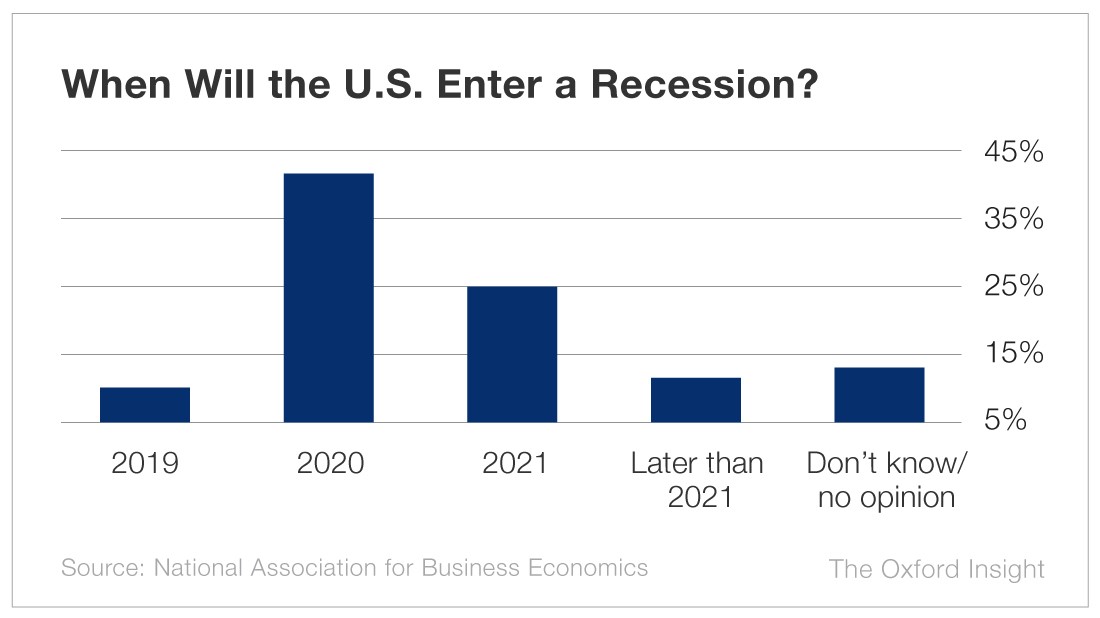Economists Say a Recession Is Coming
From the Baltimore Clubhouse – Is a U.S. recession imminent?
Business economists say it is. (But I have my doubts.)
First, the data. Three-quarters of the 281 business economists surveyed by the National Association for Business Economics (NABE) say the U.S. will enter a recession by the end of 2021. Here’s the breakdown of when they think it will start…

But it’s a widely held economic belief that expansions don’t die of old age. (Just consider Australia’s economy, which has skirted recession for 27 years and counting.)
Instead, something has to kill an expansion off. An oil embargo, a terrorist attack, a series of interest rate hikes… whatever it may be, a death blow is always necessary.
So what will deliver the fatal blow to this U.S. expansion, which at 114 months is the second longest in U.S. history?
According to the NABE survey, most of these economists say the Fed’s policy has been about right so far. So – this time at least – the Fed will most likely not be the culprit.
Illegal immigration also will have little impact on the economy, despite the claims of the Trump administration, the economists say.
They consider our healthcare system (which is driving us deeper into debt every year through our underfunded health programs) to be “troubled.” But it will muddle through for another decade or two. No expansion killer there.
And while growing budget deficits are problematic, those surveyed said they believe the Trump tax cuts (which will add $1.9 trillion to the national debt over 10 years) are stimulating the economy – not hurting it.
Instead, by a margin of 42% to 17%, they believe tax hikes, in particular the 70% rate on income over $10 million proposed by some congressional Democrats, will be bad for the economy. But such dramatic tax increases have no chance of enactment in the next two years, and it’s far from clear they will ever see the light of day.
A majority of these economists also see Trump’s deregulatory agenda as an ongoing positive for the economy. That’s an expansion supporter, then, propping it up in its old age.
So why do all these economists believe we’re looking at a recession in a year or two?
The single factor these economists are in agreement on is tariffs. Almost two-thirds of the economists surveyed by NABE said the Trump tariffs – if kept in place – would decrease U.S. GDP growth significantly.
That’s probably why President Trump’s announcement this week that he would delay an increase in tariffs on $200 billion of Chinese goods drove equity markets up. (The tariffs were scheduled to rise significantly, to 25%, on March 2.)
Trump abandoned that deadline by suggesting that an agreement with China is near.
The leaders of both China and the U.S. have enormous incentive to ink a deal, as otherwise the repercussions would be disastrous. An economic disaster for China, which relies heavily on exports for growth and political stability. A political disaster for Trump, who is looking at a very difficult 2020 election.
So, what, you might now be asking, could murder this expansion?
I tend to think it’s all the negativity in the money media and the resulting disconnect between people’s perceptions and the actual state of the economy. This is something Chief Investment Strategist Alexander Green has written about repeatedly.
Bad news is interesting. It sells papers and television advertisements. And economists – like those surveyed by NABE – are just as susceptible to it as the rest of us.
“This relentless negativity has unintended consequences,” Alex wrote recently. “And nowhere is this truer than in the investment arena.”
Our strategists at the Club look beyond the negative headlines and bad-news stories. When you do that, there’s a lot more to see – and to profit from.
Good investing,
Matt